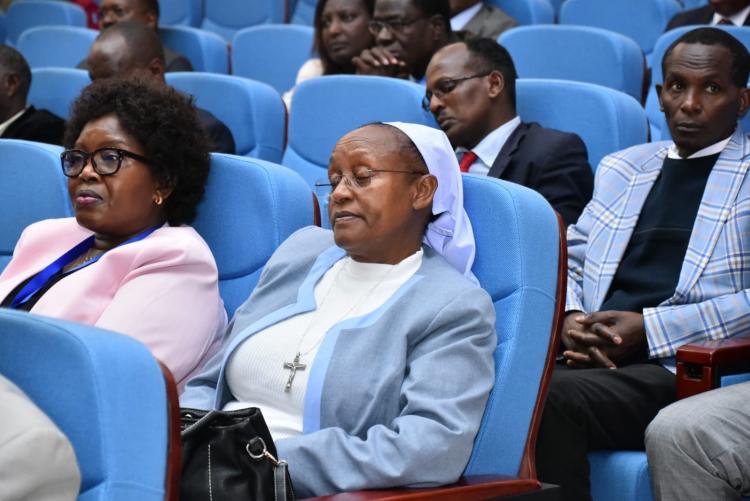The Department of Anthropology, Gender and African Studies within the Faculty of Arts and Social Sciences, University of Nairobi, held the 5th Conference on the Status of African Women during the 5th UoN Research Week. This year's theme: Women’s Economic Empowerment in the Changing World of Work and Entrepreneurship During and After COVID-19.
The keynote speaker, Prof. Goski Alabi, President, Laweh Open University College, Ghana, kicked off the conference by setting its agenda. Her presentation included all things that challenged the empowerment of women in Africa. Such as teenage pregnancy and teenage motherhood; which is a very common and ever rising issue that largely affects the wellbeing of our young women and deprives them of the ability to continue and have control over their future.
She challenged the need for policies and government intervention in order to tackle the ever growing crisis and went on to emphasize the need for women, especially in their young developing years to stay in school, and the immense importance it holds on their future. “An empowered woman has a sense of self-wealth, their ability to have control over themselves.”
However, she noted that it’s not only teen pregnancy we need to tackle, but also teen marriages. “Nearly 700 million women alive today, roughly 10% of the world’s population – were married before they were 18, and of those figures, 42% of women in Africa are teen brides.” Later emphasising the damage that child marriages have on women, due to how they deprive girls their education, health and security.
As she went on to conclude her presentation she touched on more topics that affect the wellbeing of women, such as inequalities in the workplace, asking “To what extent does being a woman affect our chances of being employed?”, as well as “Have employers prepared themselves for maternity care?”. Calling upon the need to have better policies in the workplace in order to ensure women aren’t limited by their natural biological phases, such as pregnancy.
Furthermore, she spoke on gender based violence, “1-5 women have experienced physical, psychological and emotional abuse and educated women aren’t exempted from this” Stating that the effect of the COVID19 pandemic has increased these odds, and called on the need to protect the safety of women even within their marriages and homes, and create spaces which will help in assistance for women living in an abusive household.
The other keynote speaker, Prof. Alice Odingo, Geography, Population and Environmental Studies (GPES), University of Nairobi. Began by first acknowledging the excellence of Prof. Goski Alabi presentation, emphasising the need to take her points into action. She gave her presentation, speaking on the 5th goal of Sustainable Development Goals by the UN. This being the achievement of Gender Equality and Empowerment for all women and girls. She shared some of the UN’s findings which emphasised the inequality of women in our society.
Such as women account for 39% of total employment in 2019, while 45% of global employment losses in 2020. Highlighting just how great the gender inequality within employment is. She went on to urge the need to have more women employed within the workplace as women are often those who contribute the most of their finances back to their household and family.
The 2-day Conference saw a total of 13 presentations from various Lectures and Professors from a variety of Universities, including the University of Nairobi. Closing remarks were given by Dr. Dorothy Njiraine Research Coordinator, Faculty of Art and Social Sciences, University of Nairobi. Who thanked the Vice Chancellor Prof. Stephen Kiama, the Research Week Committee and the Faculty of Arts and Social Sciences for their tireless efforts towards the empowerment of women.
The virtual conference commenced with addresses from, Dr. Marygorety Akinyi Chair, Organizing Committee Prof. Wanjiku Kabira, The Convener, Director, African Women Research Studies Centre (AWRSC), Prof. Gidraph Wairire Chair, Department of Sociology, Social Work and African Women Studies, Prof. Jack Odhiambo Dean, Faculty of Social Sciences, and Prof. Margaret Hutchinson Associate Vice Chancellor, Research and Extension who represented the Vice Chancellor Prof. Stephen Kiama. Their messages emphasised the importance and benefit of empowerment of women towards the society.
The Conference was keen in the broadness of its research in order to ensure that each topic under women empowerment was featured and discussed. A key emphasis was made in the relevance of the COVID19 pandemic and how that affected women activities, in the market and society as a whole. Looking into the digital technology and Markets during the pandemic, and Women in businesses and in the informal sector during the pandemic. During this session, the keynote address was given by Dr. Mary L. Mbithi, Director of Research at the Women’s Economic Empowerment Hub (WEE Hub), University of Nairobi, Faculty of Arts and Social Sciences
Furthermore, the impact of the COVID19 pandemic caused an alarming risk to the health and safety of women, showing how greatly disadvantaged women were. With a large increase in gender based violence amongst women, and the Psychosocial Effects of Interrupted Learning in Schools had on the girl child.
The Keynote Speaker for the second day of the conference was Prof. Alice Odingo from the Department of Geography, Population and Environmental Studies (GPES),UoN, she noted that, 'One of the many challenges that face women empowerment is the difficulty to hold a forum where both men and women are present in order to discuss gender equality, which is often too difficult to begin with."
She stated her view of an empowered woman as being, “A woman who has control over their future and can stand on their own”.
This was thereafter followed by presentations from various lectures from different institutions and Universities. Bringing a close to the Conference with a Vote of Thanks from Dr Marygorety Akinyi Conference Chairperson and the closing remarks from Dr. Dorothy Njiraine Research Coordinator, Faculty of Art and Social Sciences, University of Nairobi.

